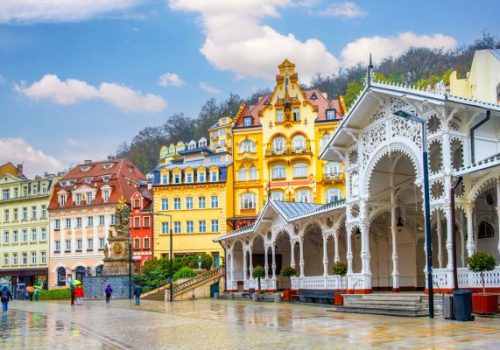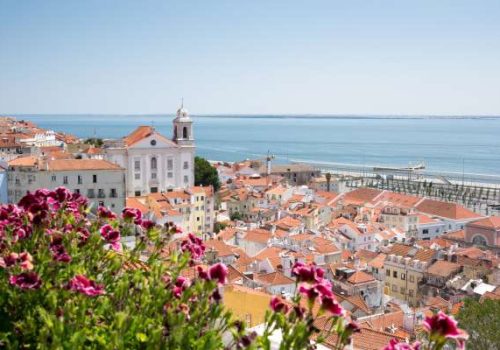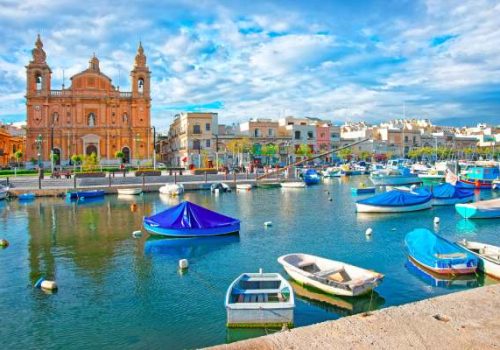Live and work in Berlin
Berlin is the capital of Germany. It is the largest city in Germany and the second largest city in the EU after London. 3.8 million people live in the city. If there is one city bursting with historical sites, it is definitely Berlin. Just think of the Berlin Wall, which was torn down not even that long ago.
Berlin is a vibrant city and living and working in Berlin is an adventure every day. The city has a great cultural offer, many hip neighbourhoods, modern architecture and a strong appeal. This city is just a bit different from other European cities. On this page, you can read why living and working in Berlin is so great!
Latest jobs abroad
- Customer support
- Czechia
- Customer support
- Portugal
- Customer support
- Latvia
- Hotel jobs, Tourism
- Cyprus, Greece, Spain
Work in Berlin
Working conditions in Berlin
The German economy is considered the fourth strongest economy in the world. As a result, there are an awful lot of opportunities to work in Germany. Sometimes, knowledge of the German language is not necessary for your work, but it is useful to know some German. Of course, you can always take a German course, which might also help you get to know new people.
A German working day normally lasts from 9 to 5. An average working day therefore lasts about 8 hours.
Employees with a regular working week of 5 days are entitled to at least 20 paid holidays per year. However, the average is between 26 and 30 holidays. There are even companies or government agencies that offer more than 30 holidays per year.
Salaries in Berlin
Salaries in Germany are among the highest in the world. For example, the average gross monthly salary of a customer service employee in Germany is €2610.
It is worth noting that the tax rate can be fairly high in Germany. Namely up to 50% of the gross salary.
The amount of the salary is stated in the contract, where bonuses and salary reviews are normally also discussed. In most cases, a 13th month is also paid out, around December or split between Christmas and the summer holidays. In some management positions, even a 14th month is paid out.
Public holidays in Berlin
If you are going to work abroad, it is of course useful to know exactly which public holidays are celebrated in your new home country and therefore on which days you are free. In this section, we have therefore listed all the public holidays in Germany and Berlin for you.
Germany has 9 official holidays and 7 regional holidays. The official holidays are celebrated nationally and the regional holidays are celebrated only in certain German regions.
The official holidays in Germany are:
- New Year’s Day (1 January)
- Good Friday
- Easter Sunday
- Easter Monday
- Labour Day (1 May)
- Pentecost
- Ascension Day
- Whit Sunday
- Whit Monday
- Christmas Day (25 December)
- Boxing Day (26 December)
International Women’s Day (8 March) is a regional holiday celebrated in Berlin.
Work culture in Berlin
Berlin is, of course, a large, international city and people from all over the world work there. English is therefore the working language in many offices. If your German is not yet perfect, but you would like to work in Berlin? No problem, because there are plenty of companies in Berlin constantly looking for multilingual employees.
The working culture in Berlin is a lot more formal. You will also find that there are clear hierarchies and different layers within companies. For example, Germans like to keep work and private life very separate and usually address their manager as Sie.
Moreover, Germans are known to be punctual, efficient and organised. So make sure you get to work on time. In addition, you can expect clear procedures and systems.
Networking in Berlin
With many international companies and startups in the city, Berlin is the ideal city for people looking to expand their professional network. Berlin offers you the chance to meet professionals from all over the world. Free networking events and job fairs are regularly organised in the city. Especially if you want to live and work in Berlin and are looking for a new job in the city, these networking events can be very valuable.
We therefore recommend keeping an eye on websites like Eventbrite, Meetup and All Events. You will find various networking events and job fairs on these websites.
Applying for a job in Berlin
Writing a German cover letter
Do you already speak a word of German? Then of course it is always a good idea to submit your cover letter in German. Just make sure you check your letter carefully for grammatical errors. After all, you want to make a good first impression with your future employer!
German employers love comprehensive job applications. Write a comprehensive cover letter and make sure your CV is up to date with a passport photograph. Moreover, German employers also value diplomas, certificates and transcripts. Therefore, do not forget to attach these. Most professionals in Germany have an account on XING (similar to LinkedIn). You might also want to create a profile on this networking site so that you can be found online as well.
Job interview in Berlin
The most important tip we can give you is to come well-prepared for your job interview. Familiarise yourself with the company and the position by looking at the website and rereading the vacancy.
If you already speak a little German, try to conduct the interview entirely in German. Even if you applied for an international position. This is because it is highly appreciated and you will score extra points.
Germans also value references and good grades. During the interview, talk about previous projects and refer to marksheets and references. As Germans are very punctual, we also recommend you arrive on time. A few minutes before the interview is sufficient.
Working in Berlin vacancies
First of all, we recommend that you start looking for a suitable job in Berlin on time. Even before you leave for Berlin. That way, you know where you stand and you don’t have to worry about your monthly income, but can fully focus on your new adventure.
Would you like to work abroad? Then take a look at our vacancies page and apply for your favourite job! Our recruiters will then contact you as soon as possible to tell you more about the application process.
Live in Berlin
Advantages of living and working in Berlin
Why this city is slightly different is hard to explain. It is a city that exudes something and has a certain atmosphere. Something you should experience for yourself. It is a city with symbols and even shopping there is addictive. Berlin is not only becoming more and more attractive for tourists, but living and working in Berlin is also becoming increasingly popular. A big advantage is that living in Berlin is a lot cheaper than in many other European cities.
In culinary terms, too, the city has a lot to offer and we will elaborate on this later.
Not to mention the nightlife scene in Berlin: the most vibrant nightlife in Europe. You are guaranteed to have a great night when you go out in Berlin. In short, living and working in Berlin has plenty of advantages.
On this page, you can read more about living and working in Germany in general.
Accommodation in Berlin
Although rental prices in Berlin have risen considerably recently, they are still considerably lower than in Amsterdam.
You can expect to spend around €1,230 per month on rent for a 1-bedroom flat in central Berlin. The monthly rent for a 1-bedroom flat outside the city centre is around €920. But here, of course, the better the condition of the flat, the higher the rent will be.
Are you looking for a flat in Berlin? Then take a look at the Facebook groups Flats in Berlin and Berlin Housing.
Useful websites
For rental properties:
Where to stay in Berlin?
Examples of nice (residential) neighbourhoods in Berlin include Mitte, Kreuzberg, Friedrichshain, Neukölln and Charlottenburg.
How does public transport work in Berlin?
Public transport in Berlin is relatively cheap and ideal if you want to get around quickly. Subways S-Bahn and U-Bahn, buses and trams are most commonly used.
Public transport in Berlin is divided into 3 different zones: A, B and C. Below is an overview of different tickets you can purchase. Ticket prices may vary per route/zone:
- Kurzstrecke (up to 3 stops) – €2
- Einzelfahrt/single trip: Zone AB: €3 – Zone BC €3.50 – Zone ABC €3.80.
- 4X Einzelfahrt/single trip – €9.40
- Tageskarte/day ticket €8.80
- 7 Tageskarte/7 days ticket €36
- Monthly ticket €86
How does the metro in Berlin work?
The metro in Berlin is called the U-Bahn (Untergrundbahn). The stops can be recognised by the blue signs with the white ‘U’ on them.
Berlin is divided into 3 zones. A is the inner city, B represents the suburbs and C is the area around the city. When travelling within the city, you need an AB card. This card allows you to use all forms of public transport in Berlin for 2 hours. Please note that this ticket is only valid as a single ticket. If you want to travel back, you need to buy a new ticket.
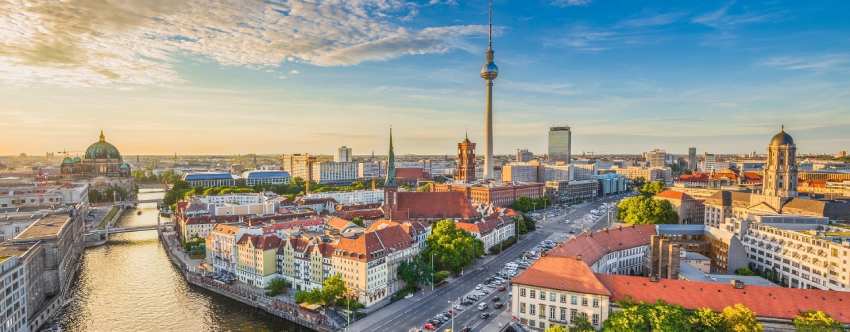
Eating in Berlin
From sushi to schnitzel and from Mexican to Indonesian. Berlin also has a lot to offer in terms of culinary delights. You can find countless restaurants that are also affordable.
There are also regular street food markets.
Below are a number of districts and places in Berlin where you can eat deliciously:
Mitte
This is a central spot in Berlin where most of the restaurants are located. These are mainly found around Weinmeister Strasse, Hackescher Markt, Rosenthaler Platz and Oranienburger strasse. Do you fancy a simple dish? Or rather a luxury dinner? Everything can be found here! Have you been out to see the Berlin sights? Then you can also go around Gendarmenmarkt and Friedrichstrasse to relax and have a nice bite to eat.
Friedrichshain
With Simon Dach Strasse, Friedrichshain is known for its many restaurants, eateries and other joints where you can grab a bite to eat. You will also find plenty of local restaurants in Friedrichshain. A quick bite at a Vietnamese restaurant or pampering yourself at Saporito… everything is possible in Friedrichshain. Just let yourself be surprised!
Charlottenburg
The chic Charlottenburg district has many good (and expensive) restaurants, but around the cosy Kantstrasse you will find a lot of cosy authentic and affordable Asian restaurants. It’s a fine district if you want to enjoy a night out for dinner!
Nightlife in Berlin
Going out in Berlin is just a bit more fun and special. The city is not known for its vibrant nightlife for nothing. There is always something going on!
There are many clubs, bars and street parties in Berlin. The music scene, techno culture and many concerts can safely be called the biggest plus of Berlin’s nightlife scene. The offer consists of around 300 legal clubs. Quite difficult to choose, right?
Below are some places and districts where you can go out well:
Clubs:
Most clubs are in the east of Berlin. Mainly in districts like Mitte, Friedrichshain-Kreuzberg and Prenzlauer Berg (around Eberswalder Strasse).
Bars:
Oranienburger Straße
Here you will find many cocktail bars and pavement cafés. It is a little bit touristy here. Especially in the side streets Auguststraße and Torstraße there are lots of nice bars!
Oranienstraße
A little alternative, multiculti and cheap bars.
Simon Dach Street
Hip among Berliners and a varied selection of cocktail bars and alternative joints.
Bergmannstraße
Besides some tasty Asian restaurants, you’ll also find some nice bars here.
Berlin’s landscape and nature
Berlin is anything but a city consisting only of tall office buildings, busy infrastructure and lots of shops. Instead, the city is incredibly green! Berlin is even the greenest city in Europe. 13% consists of parks and gardens, 18% of forest and another 7% of lakes, rivers and canals. So plenty of room for relaxation and a nice walk.
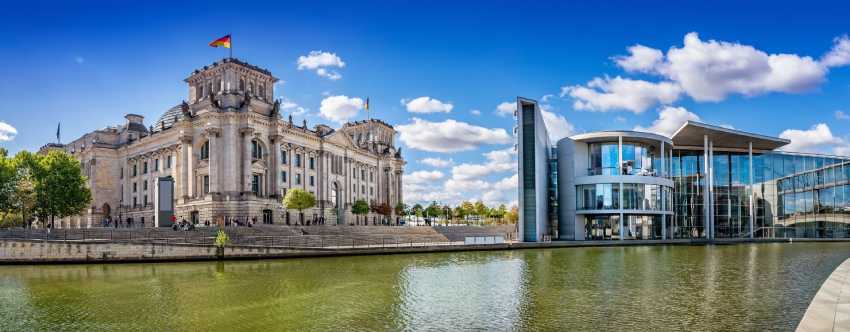
What not to miss in Berlin
Berlin Wall
Although the bear is symbolic in Berlin, the city is known worldwide for the Berlin Wall. The wall divided the communist east with the capitalist west of Berlin from 1961 to 1989. This separated families, causing much grief. Still, there were many people who tried to cross the border.
Much information about this turbulent period in Germany can be found at the most famous border post ‘Checkpoint Charlie’. Despite this wall being long gone, many remains can still be found in the city.
Checkpoint Charlie
Back in the days when Berlin was divided into East and West Berlin, there were a few passages where you could travel. The third passageway, Checkpoint Charlie (C is the third letter of the alphabet), is a very important landmark in Berlin. What currently stands there is a replica of the original guardhouse between the US and Russian zones. You can combine the nearby Mauermuseum (dedicated to the wall) with a visit to Checkpoint Charlie.
Museums
In a city known for its history and culture, there are of course many museums. You can easily take a week to visit all the interesting museums. Here are some tips: in the DDR Museum you will learn all about former East Berlin. The Currywurst Museum is dedicated to the local delicacy of the same name. In addition, the Neues Museum, the Pergamonmuseum, the Bode-Museum and the Alte Nationalgalerie are also interesting tips!
Monuments in Berlin
There are also plenty of famous monuments and statues in Berlin. Consider, for instance, the Holocaust Memorial commemorating the persecution of Jews during World War II. This impressive monument consists of no less than 2711 concrete blocks and it also includes an information centre where various exhibitions are held.
The Brandenburg Gate, Siegessäule and Schiller Monument are also important monuments in Berlin.
Gendarmenmarkt
This square in the heart of Berlin can safely be counted as one of the most beautiful squares in Europe. The square is characterised by three buildings: the Konzerthaus Berlin in the centre and two similar churches on either side of the concert hall: the Französischer Dom and the Deutscher Dom. From the steps of both churches you have a great view. On the terrace on the square, you can relax and enjoy the view.
Healthcare in Berlin
Germany has an excellent healthcare system. In Germany, you have the choice of many different doctors and hospitals. Long waiting lists are very rare there. Most of the costs of using medical care and medication are also covered by health insurance schemes. In short, when it comes to healthcare, Germany is the place to be.
Health insurance in Berlin
Taking out health insurance in Germany is compulsory. In fact, you cannot come to work in Germany without having taken out insurance. Public health insurance is mandatory for all employees with an income below €49,500 per year. Taking out private health insurance in Germany is only possible if you earn more! Once you have taken out private health insurance, it is no longer possible to switch to public health insurance.
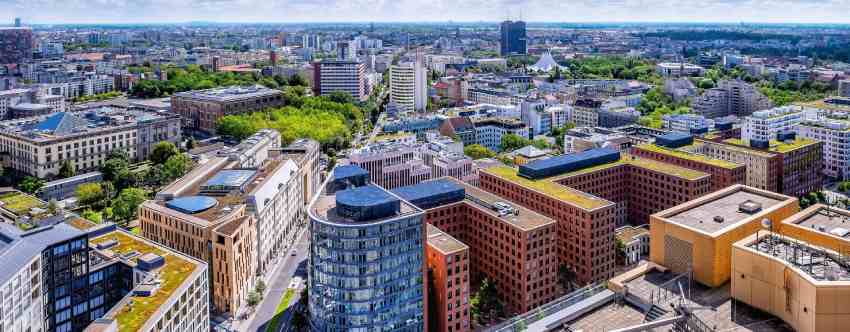
Visa and travel insurance Berlin
As an EU resident, you do not need a visa or work permit to work in Berlin. All you need is a valid ID card or passport.
Safety in Berlin
In Germany and therefore also in Berlin, the security risks are similar to the Netherlands. Watch your belongings carefully and never leave your belongings unattended.
Living and working in Berlin: what do you need to arrange?
Register as a resident of Berlin
You officiallyneed to register as a resident of Berlin within 2 weeks of your arrival. You can register at the municipality of Berlin. Make sure you make an appointment here on time. Bring your employment contract (or other proof of income), a completed registration form and a valid ID.
Apply for a German tax number
Once you have registered as a resident at the municipality in Berlin, you will also automatically receive your Steuer ID (tax number) by post. You will need this number for your tax return, for example.
Opening a German bank account
Finally, it is important to open a German bank account. You need a bank account to rent a house in Germany or apply for an internet contract, for example.
To open a bank account, you need a copy of your registered address in Germany, a valid ID and a tax number.
More information on working in Berlin
Is Berlin expensive?
According to Numbeo, a company that examines the cost of living by location, it is 12.36% cheaper to live in Berlin compared to Amsterdam.
Moreover, rent in Berlin is 25.3% cheaper than in Amsterdam and, as a single person, you can get by on €984.43 a month (rent not included).
Where do I pay tax if I work in Berlin?
You pay tax in the country where you work. So if you work in Germany, you will pay tax in Germany.
Is Berlin a safe city?
Safety in Berlin, as in many major cities, can vary depending on the area and specific circumstances. In general, Berlin is considered a reasonably safe city for tourists and residents.
As in any city, though, it is important to pay attention and take some precautions, such as keeping personal belongings in a safe manner, paying attention in crowded places and avoiding remote or poorly lit areas at night.
Why is Berlin popular?
Berlin enjoys global popularity for several reasons. The city has a rich history, which is evident in its architecture, museums and monuments, including the iconic remnants of the Berlin Wall. In addition, Berlin is known for its vibrant arts and culture scene, with numerous galleries, theatres and music festivals. The city is also a breeding ground for creativity and innovation, making it attractive to young professionals and start-ups. Moreover, Berlin offers a lively nightlife, diverse culinary scene and green parks. The open and tolerant atmosphere attracts an international community, and the affordable cost of living is ideal.
What is the average salary in Berlin?
The average salary in Berlin is €3105.26 per month in 2024.

